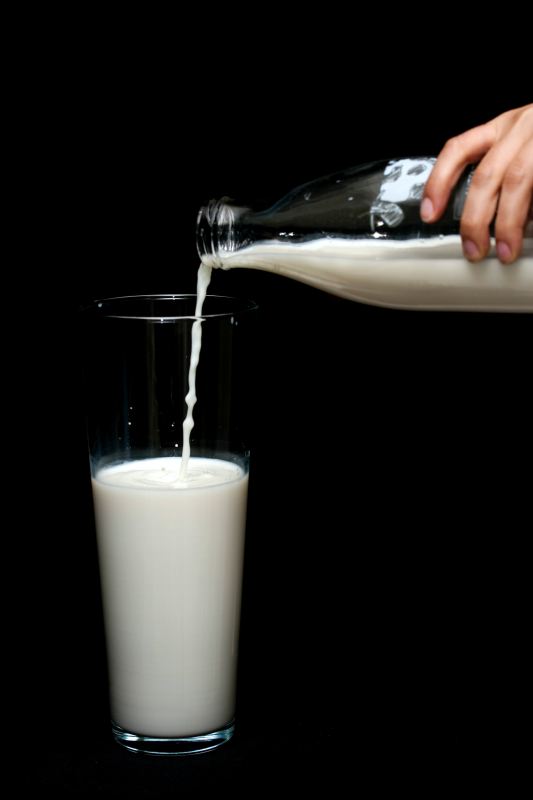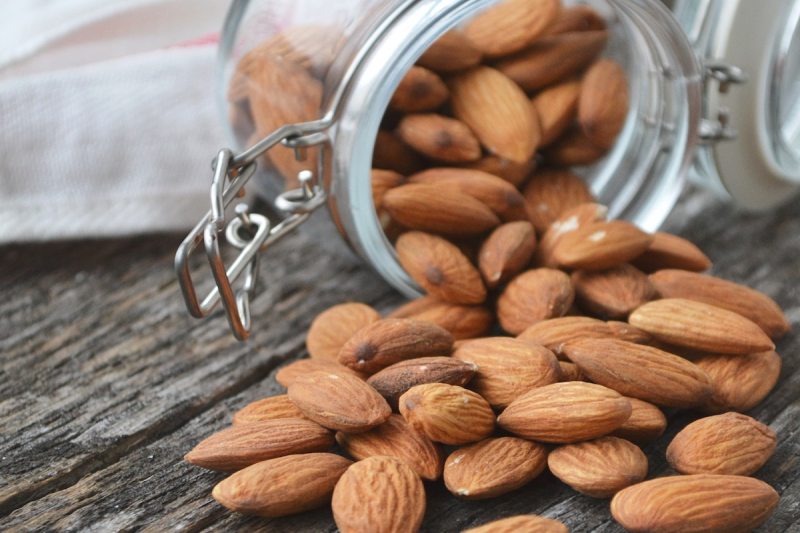
Although the importance of consuming enough calcium tends to be a discussion focused more heavily on women, calcium is equally important for men. Calcium supports your bones, teeth, muscles, nerves, and more. When most people think of calcium-rich foods, milk and dairy products are the first — and perhaps only — foods that come to mind.
Dairy products do tend to be high in calcium, but there are also non-dairy foods, including healthy vegetables and seeds, that provide calcium as well. These plant-based foods are key sources of calcium for those following a vegan diet. Read on to find out more about calcium, its benefits, and the top foods high in calcium.

What is calcium?
Calcium is the most abundant mineral in the body that is critical for forming the structural components of bones and teeth. It’s an essential nutrient your body can’t produce, so you have to get it from your diet. Furthermore, calcium plays key roles in muscle contraction, nerve conduction, heart health, and the secretion of various enzymes and hormones.
Almost all the calcium in your body is stored in your bones and teeth. Calcium needs vary throughout the lifespan, but the daily value for most men is between 1,000 and 1,300 mg. A calcium deficiency can increase your risk of fractures and cause fatigue, numbness and tingling, appetite changes, and other adverse health effects.

Why is calcium good for your bones?
Your bones are your structural framework, and they’re also a reservoir of calcium. There’s a good reason behind the old advice to drink milk and get more calcium for strong bones. If you don’t have enough calcium in your blood, your body will start to take it from your bones, resulting in poor bone health. The priority is to keep enough calcium in your blood. This is one of the reasons why calcium is so critical for bone health.
When your calcium levels drop too low, your parathyroid hormone signals to your bones to release calcium, which weakens your bones and could even lead to osteopenia over time. Osteopenia is a condition involving low bone density and an increased risk of fractures. Over time, osteopenia can turn into osteoporosis, where the bones are extremely fragile, porous, and at risk for breaks.

What are the benefits of calcium?
As an essential mineral, calcium provides numerous health benefits, including:
- Supporting your heart, nerves, and muscles
- Assisting your blood’s ability to clot
- Helping to maintain body weight
- Protecting against cancer, including colon cancer
- Building strong bones
- Lowering high blood pressure
- Improving cholesterol levels in the blood
- Decreasing the risk of heart disease
- Treating preeclampsia (high blood pressure) in pregnant women.
Calcium is particularly crucial for infants and children during development. This mineral has been proven to lower blood pressure and smooth muscles around your blood vessels, which could improve the functioning of your cardiovascular and circulatory systems.

The top foods richest in calcium
Here are the top foods richest in calcium so you know where to source this vital mineral.
Milk
Milk is rich in calcium, with about 300mg per 8-ounce glass of skim milk. Whole milk and low-fat milk are slightly lower in calcium, though the bone-building benefits of calcium in milk that contains some fat may be enhanced. This is because milk is also a good source of vitamin D — a steroid hormone that increases the absorption of calcium and phosphorus in the gut — and vitamin D is a fat-soluble vitamin.
In other words, the nutrients in milk with some fat are more readily taken up by the body. If you don’t drink dairy milk, look for soy or almond milk fortified with calcium. Although this calcium is synthetic, alternative milk can still be a good source of calcium.
Yogurt
Because yogurt is made by fermenting milk, it is also high in calcium. One cup of low-fat yogurt contains about 488mg of calcium or about 38% to 48% of the daily value, depending on your needs. Yogurt is also rich in gut-healthy probiotics, which can aid digestion and support your immune system.
Sardines
Sardines and small fish eaten with the bones are quite high in calcium. A 3.75-ounce can of sardines provides about 30% of the daily value of calcium. Clams, trout, and canned salmon with the bones are also excellent sources of calcium. Fatty fish, such as sardines and mackerel, are also rich in omega-3 fatty acids, which have anti-inflammatory effects and improve heart health and brain function.
Sesame seeds
Seeds are certainly superfoods when it comes to providing vital nutrients. They have protein, omega-3 fatty acids, zinc, vitamin E, and other key minerals, one of which is calcium. For example, a tablespoon of sesame or poppy seeds contains about 125 mg of calcium. Add seeds to yogurt, granola, cereals, smoothies, salads, and trail mix or eat them as a bedtime snack. After all, many seeds are also high in tryptophan, an amino acid that supports sleep. A one-ounce serving of squash or pumpkin seeds provides 164 mg (58% RDI) of sleep-inducing tryptophan.

Dark, leafy green vegetables
Leafy green vegetables like spinach, kale, chard, collard greens, and beet greens are among the healthiest vegetables on the planet. They are packed with fiber, water, vitamin C, vitamin A, iron, antioxidants, phosphorus, and nitrates, which improve circulation and may lower blood pressure.
Leafy greens are also high in calcium, though it isn’t as readily absorbed as it is in non-plant sources. Iron inhibits the absorption of calcium. That said, you can’t go wrong with loading up on greens. A cup of cooked collard greens has over 260 mg of calcium, while spinach is a close second at around 245 mg per cup.
Fortified orange juice
Some commercial orange juices are fortified with calcium. Orange juice is also high in vitamin C, which increases calcium absorption. However, juices are high in natural sugars, so they are not the healthiest choices on this list, especially for those with blood sugar issues.
Figs
Certain dried fruits, such as figs and prunes, are relatively high in calcium. They also contain fiber, potassium, vitamin K, and iron. Dried fruit can make a good pre-workout snack, providing energizing carbohydrates without weighing you down.
Fortified tofu
Most tofu is prepared by soaking and pressing the soybean curd with calcium sulfate. This process fortifies the tofu with calcium. A half-cup of firm tofu may contain around 800 mg of calcium, which can be upwards of 80% of your daily value. Tofu is also packed with protein, antioxidants, and polyphenols, some of which reduce the risk of various diseases, including heart disease, certain cancers, and prostate enlargement.

Cheese
Though cheese sometimes gets relegated as an unhealthy food due to its sodium and fat content, cheese actually provides valuable nutrients and can be part of a healthy diet. Cheese contains protein and can be quite filling. Most cheeses are also excellent sources of calcium, particularly the harder cheeses. For example, Parmesan cheese, which is cheese with the most calcium, provides 242 mg per ounce. As with milk with fat, the body tends to absorb the calcium in cheese quite well, as it is paired with vitamin D and fat.
Moreover, in general, calcium absorption from plant-based sources tends to be lower because other compounds in the plant inhibit the bioavailability and absorption of calcium to some degree. For example, beans and legumes contain phytates, and leafy greens contain iron, both of which reduce calcium absorption.
Fortified breakfast cereal
Many breakfast cereals are fortified with essential nutrients, including everything from vitamin B12 — critical for energy generation — to iron. Many healthy breakfast cereals also contain up to 30% of the daily value of calcium. Look for cereals that use only whole grains, contain at least 4 to 5 grams of dietary fiber, and have little to no added sweeteners. These cereals will provide sustained energy from complex carbohydrates and lasting satiety without spiking your blood sugar.
Whey protein powder
Whey protein powder is the concentrated isolate of whey protein, which is derived from milk. As such, it’s not only high in protein but also high in calcium. For example, a scoop of whey protein powder (1.2 ounces) provides about 160 mg of calcium. Whey protein powder can be added to make protein shakes, smoothies, protein-packed oatmeal, or homemade protein balls.

Almonds
Almonds contain more calcium than any other nut, at about 246 mg per 100 grams of raw almonds. They are also an excellent source of fiber, healthy fats, and vitamin E, which make almonds a great food for healthy hair and skin.
Beans and peas
Legumes, including beans, peas, and lentils, are excellent sources of fiber, protein, and minerals such as iron, zinc, potassium, folate, and magnesium. Legumes such as soybeans and peanuts are also high in biotin, a B vitamin that supports hair and skin. Some varieties of legumes are also good sources of calcium. For example, one cup of black-eyed peas has nearly 300 mg of calcium. Navy beans, white beans, and even green peas are also high in calcium.



